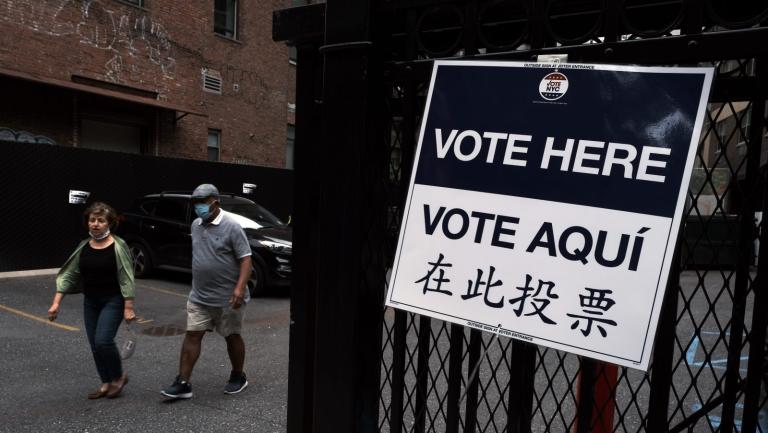Representative John Curtis of Utah wasn’t always interested in tackling climate change. In 2018, his first full year in Congress, he voted against 35 climate and environmental bills, according to the League of Conservation Voters, an environmental advocacy group that keeps track of how members of Congress vote. But earlier this year, Curtis invited his fellow Republican lawmakers to Salt Lake City to talk about rising temperatures. He hoped six lawmakers would show. Two dozen Republicans took him up on his offer, including six ranking members of congressional committees. Now, Curtis is keeping the momentum going by starting a new GOP-only climate caucus in the House of Representatives.
For decades, Democrats have been trying to get Republicans to take climate change seriously. But GOP leaders and Republican voters in general have only become more polarized over time. Meanwhile, the impacts of global warming have accelerated. Democrats no longer have time or patience to persuade Republicans to join the right side of history. “We can’t sit around and wait,” Pete Maysmith, senior vice president of campaigns at the League of Conservation Voters, told Grist. “It’s just not acceptable.” Republicans like Curtis have now begun trying to coax a climate platform out of the GOP, and they could have better success drumming up conservative support for climate action by working from within the party.
The new Conservative Climate Caucus, which Curtis announced on Wednesday, is a bigger, more official version of what he started in Utah. The purpose of the group is to educate lawmakers on climate science and highlight some of the more localized impacts of the climate crisis so that representatives can tailor their messaging to their respective districts. So far, more than 50 House Republicans have joined the caucus, and more could sign on in the coming weeks.
“It’s my hope that any Republican that belongs to this caucus, if asked about climate in a town-hall meeting, will feel very comfortable talking about it,” Curtis told the New York Times. “I fear that too often Republicans have simply said what they don’t like without adding on ‘but here’s our ideas.’”
Daniel Richter, vice president of government affairs at the environmental advocacy group Citizens Climate Lobby, is optimistic about Curtis’ intentions. “I really think that he is genuinely committed to addressing climate. I think he sees a genuine opportunity for Republicans to talk about this and to win elections on this,” Richter told Grist. Richter went on an 8.5-mile hike with Curtis at the Alta Ski Resort in Utah this week to talk about the congressman’s new caucus. “My understanding of this caucus is that it is a way for Republicans to learn how to do this together, to accelerate the ambition within the Republican party,” Richter said.
The caucus is not meant to produce any concrete climate policies. Right now, it’s just a safe space for Republicans to gather and learn more about the science behind climate change and take a look at a few possible solutions to the problem. Maysmith, from the League of Conservation Voters, thinks that’s insufficient. “It’s at least a day late and a dollar short,” he said.
The left, Maysmith pointed out, has been coalescing around big, bold solutions to the crisis. President Joe Biden’s multi-trillion-dollar infrastructure plan would invest heavily in climate change mitigation and adaptation measures. The right’s proposed alternatives to Biden’s infrastructure plan don’t include much in the way of climate action at all. And the climate bills Republicans have gotten behind in the past few years have generally been milquetoast investments in carbon capture and sequestration and energy innovation technologies — initiatives that are meant to complement existing fossil fuel infrastructure, not ratchet down emissions in any meaningful way.
Quillan Robinson, vice president of government affairs at the conservative environmental group the American Conservation Coalition, says lasting climate and environment policy is best accomplished when both parties are on board. The left’s plans to pass climate legislation are destined for defeat unless Republicans are in the picture, he said, which is why it’s crucial that more and more Republicans start getting involved. “We need to continue to expand the tent of Republicans who are interested in engaging on this issue and understand what a conservative approach to climate change looks like,” Robinson told Grist. That’s what Curtis hopes his caucus will help accomplish.
Curtis isn’t the only Republican in Congress interested in climate change. Senators Lindsey Graham of South Carolina and Mike Braun of Indiana have also signaled interest in the issue. So has House Minority Leader Kevin McCarthy, of California — he’s leading a Republican climate legislation push in the House. But these members of Congress generally do not vote with Democrats on other climate and environment measures. Two exceptions to that rule are the 2019 public lands package and the 2020 Energy Act, both major bipartisan successes, and they passed because they dealt with issues Republicans already care about: conservation and innovation. It may be some time before the right puts “emissions policies” on the list of issues it will vote with Democrats on, Ben Pendergrass, senior director of government affairs at Citizens Climate Lobby, told Grist. Republicans might not vote for Democratic-led climate legislation in the short term, he said. The bigger point is to make sure that the GOP doesn’t decide to undo climate progress in the future.
“There will come a time when there is a Republican administration in Congress again, and we want to make sure that there’s a bloc of Republicans who are invested in climate,” Pendergrass said. The new climate caucus might be a step in the right direction. “Even if they’re not ready to vote on some of these major policies now, they hopefully will not be willing to vote to undo the advances we have made.”




